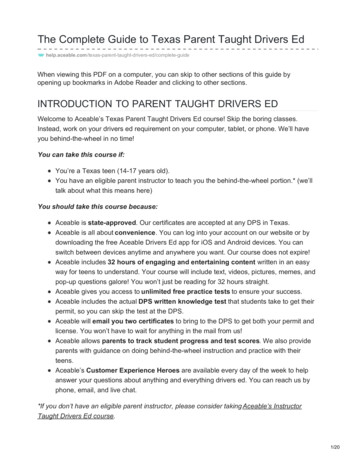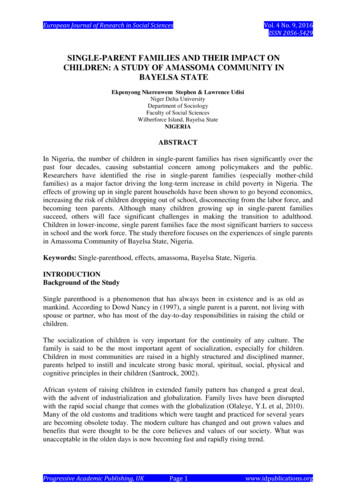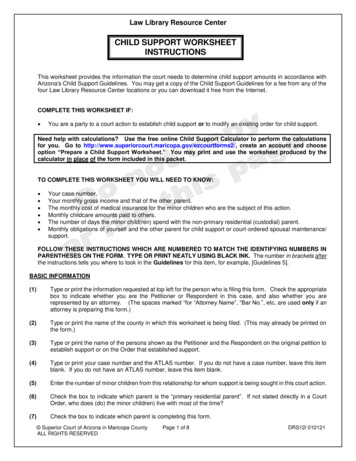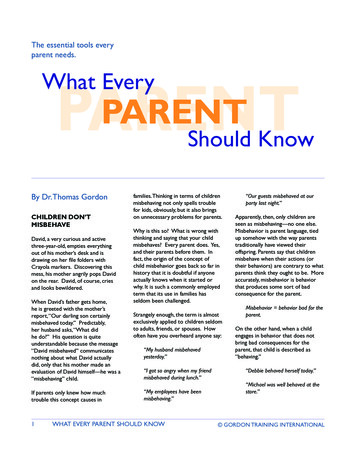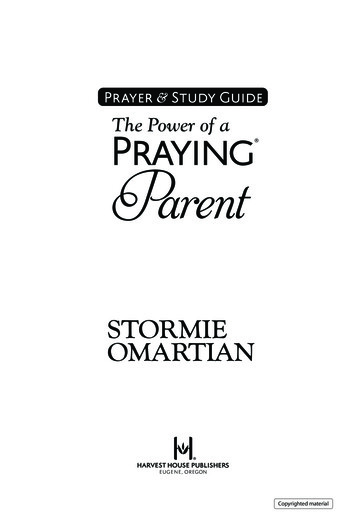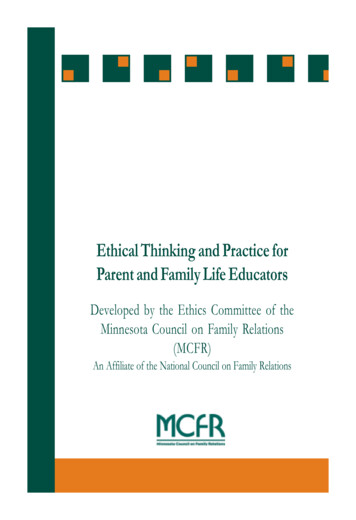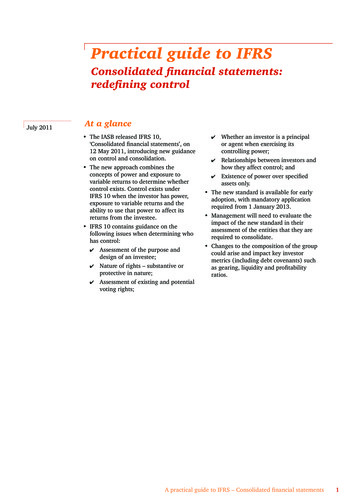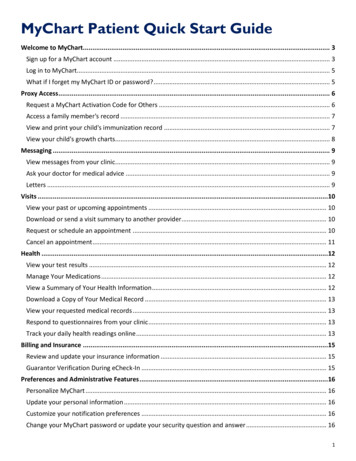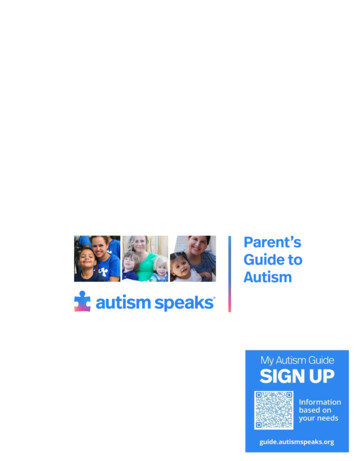
Transcription
AAParent’sParent’sA Parent’sGuideGuideGuidetotoAutismAutismto AutismAnAnAutismAutismAn upportSupportToolToolKitToolKit KitParent’sParent’sGuide toAutism toGuideAutismSupport and guidance for parents of children recently diagnosed with autism
A PARENT’S GUIDE TO AUTISMAutism Speaks does not provide medical or legal advice or services. Rather, Autism Speaks provides generalinformation about autism as a service to the community. The information provided in this email is not arecommendation, referral or endorsement of any resource, therapeutic method, or service provider and does notreplace the advice of medical, legal or educational professionals. Autism Speaks has not validated and is notresponsible for any information or services provided by third parties. You are urged to use independent judgmentand request references when considering any resource associated with the provision of services related to autism. 2018 Autism Speaks Inc. Autism Speaks and Autism Speaks Design are registered trademarks owned by Autism Speaks Inc. All rights reserved.The use of unaffiliated representatives for endorsement, advertising, promotional and sales material is prohibited by law.
A PARENT’S GUIDE TO AUTISMTable of ContentsIntroduction1Response to the Diagnosis1Your Role as a Parent3Ten Things Parents Can Do to Help Their Child with Autism5Building a Support Network6Taking Care of Yourself7How I Let Go of My Expectations and Learned Unconditional Love9Frequently Asked Questions from Parents10Resources13
A PARENT’S GUIDE TO AUTISMIntroductionIf your child has recently been diagnosed with anautism spectrum disorder, you have come to the rightplace. A Parent’s Guide to Autism was developed aspart of Autism Speaks’ series of Family Support ToolKits to support you and promote a positive future foryour child and family during an often challenging time.You are not alone in this journey and this guide is astep toward finding the help you need to travel the roadto optimal outcomes for you, your child and your family.The Autism Speaks 100 Day Kit for NewlyDiagnosed Families (versions for both children under5 and school age children) was designed to provideyou with the information and tools you need to makethe best possible use of the days following thediagnosis. It is a comprehensive tool filled with factsand resources such as information about symptoms,treatment, legal rights and advocacy. The 100 Day Kitcan be found at AutismSpeaks.org.A Parent’s Guide to Autism will help you: Learn about how autism may impact your family. Find strategies and resources for raising a childwith autism. Find support so you don’t feel alone or isolated. Reduce the negative impact of the diagnosis onyour family. Promote a positive future for your child and family.For additional guidance and support, the AutismSpeaks Autism Response Team is here to help.The team is specially trained to connect you and yourfamily to resources and information specific to yourchild’s strengths and challenges.Response to theDiagnosisLearning that your child has been diagnosed withautism is a powerful moment in your life. Suddenlyyour life may feel very different from what youexpected it to be. You worry first about your child andwhat it will mean for his or her life experiences. Youworry about how you and your family will adjust tothis in the years ahead. You worry about the day-today challenges of caring for your child with autism.This is an important turning point in your life as wellas the lives of your child and other family members.Getting emotional support and factual information tohelp you cope and promote a positive future for yourchild and family will be critical during this period.Contact the team atFamilyServices@AutismSpeaks.org(888) 288-4762(en Español 888-772-9050)*For the purposes of this tool kit, the term “autism” will be used to describe children with all types of autism spectrum disorders, including Autistic Disorder, Asperger Disorder,and Pervasive Developmental Disorder Not Otherwise Specified (PDD-NOS)1
A PARENT’S GUIDE TO AUTISMCommon Reactions to theDiagnosisEach family’s reaction to the diagnosis will be differentdepending on many factors. When a child is diagnosedwith autism, parents and other family membersfrequently experience a range of uncomfortableemotions. Whether or not you have suspected something for awhile or the diagnosis seems to have beenout of the blue, many parents experience shock whenthey hear the words, “your child has autism.”You may go through periods of denial or refusing tobelieve this is happening to your child. During this time,you may not be able to hear the facts as they relate toyour child. Denial is a way of coping. It may be whatgets you through a particularly difficult period. It isimportant to be aware that you may be experiencingdenial, so that it doesn’t interfere with making gooddecisions about your child’s treatment.Some parents mourn some of the hopes and dreamsthey held for their child before they are able to moveon. There will probably be times when you feel sad.Allowing yourself to feel sadness can help you grow.You have every right to feel sad and to express it inways that are comfortable. Anger is also a natural partof the process and you may find that it’s directed atthose closest to you. Anger is a healthy and expectedreaction to the feelings of stress that come with yourchild’s diagnosis. Expressing your anger is natural andat times healthy.There are times you might feel isolated and lonely.These feelings come from a variety of sources whenyou experience a diagnosis or other significant lifechange. Loneliness may also come from the fact thatyou simply don’t feel you have the time to contactfriends or family for company. You may also feel that ifyou did reach out to others, they wouldn’t understandor be supportive.It’s easy to become overwhelmed with your emotionsand concerns about what the future may hold. Painfulemotions are natural. If you accept your reactions andacknowledge your feelings, you will be able to moveforward and begin advocating for your child. Emotionsare powerful. If you deny your feelings or ignore them,they will often surface in unpleasant ways.Ultimately, you will likely feel a sense ofacceptance. Your life may not look likewhat you had planned and you mayhave to alter your expectations, but yourgoal remains the same: to help your childlive a happy and fulfilling life. Once youaccept the diagnosis, you will be ready toadvocate for your child and start workingtoward a brighter future.Common Areas of ConcernLike any stressful event in your life, learning your childhas autism will affect everyone in your family andnetwork of friends. It’s probably not a surprise thatyour role as parent will change and you will go throughmany positive and negative experiences in your newrole. Below are examples of new feelings you mayencounter: May feel burden with everyday responsibilityof caring child with autism. May feel pressure to become an autism expertand learn everything overnight. May worry about child and family’s future. May have difficulty finding balance and time tomanage household tasks, other children, dailyactivities, etc. May be less inclined to share feelings. May become stressed about the family’sfinances and the unknowns of the situation. May develop other problems such as stressand anxiety that can affect work life.2
A PARENT’S GUIDE TO AUTISMYour Role as aParentYour Child’s AdvocateIt is important to know that most families find a way towork together, grow stronger and learn ways to reducethe negative impact of the diagnosis and promote apositive future for their children and families.When to Seek ProfessionalHelpWhen your child is first diagnosed, you will likely findyourself fulfilling many roles: care coordinator,therapist, parent, teacher, etc. One of the mostimportant roles you will have is serving as your child’sadvocate. Advocating for your child will be a lifelongjourney that will require different skills depending onyour child’s needs.In her book, Everyday Advocate: Standing Up forYour Child with Autism, Areva Martin describes sevenprinciples that can be applied to serve as an effectiveadvocate for your child:1. Take Responsibility - Be a leader2. Learn - Be an expertIf you are experiencing several of the following signsand symptoms over a period of time, you may want toseek professional counseling:3. Think Critically - Be discerning You have trouble sleeping and don’t feel restedwhen you do sleep.6. Collaborate - Be a team builder You can’t control your negative thoughts, nomatter how hard you try. You have lost your appetite or you can’t stopeating. Others point out that you seem irritable, short-tempered or more aggressive than usual. You are consuming more alcohol than normalor engaging in other reckless behaviors. You have thoughts that life is not worth living.If you have trouble working through your emotionswithin a reasonable timeframe or you feel unable tofunction in your usual ways, it may be a good idea toseek professional help. Professional help can preventserious problems from developing in the future. Itcan help to empower us to face challenges moreeffectively.4. Speak with Authority- Be proactive5. Document - Be prepared7. Educate - Be a voice for your childMartin’s book offers examples of each principle as itrelates to real world activities that parents can do toadvocate for their child with autism.Supporting Your OtherChildrenParents of children with autism can be under tremendous stress. It may seem like there is never enoughtime to do everything that needs to be done. So muchfocus and attention is placed on the child with autism,that it is common for parents to have little time orenergy left to focus on their other children.3
A PARENT’S GUIDE TO AUTISMBrothers and sisters of children with autism frequentlyface their own challenges. Much more may beexpected from these siblings. They often need helpunderstanding the emotional reactions they areexperiencing as a result of the many changesoccurring in their lives. This support is essential totheir future well-being.Some things your other children may bestruggling with:Young children may not understand what iswrong with their brother or sister. They maybe confused and unable to fully comprehend theimplications of diagnosis.They may have feelings of jealousy andresentment if they see that their parents arespending less time with them compared to theirbrother or sister with autism.They may feel angry over unequal treatmentif their brother or sister is not disciplined in thesame way they are or given similar chores to do.They may feel embarrassment with friends orin community settings where strangers reactnegatively because of their sibling’s unusual andsometimes aggressive behaviors.They are often frustrated by the fact that theyare not able to get their brother or sister torespond or interact with them in “normal” ways.Quietly, and sometimes secretly, siblingsworry about their brothers and sisters and theirparents as everyone in a family is impacted bythe disorder in some way.Many children are unable to express theirfeelings so sometimes revert to “acting out”behaviors. For example, they may misbehaveby defying their parents or getting into troubleat school.Strategies for supporting your other children:It is important that your other children understand autism and what is going on with theirbrother or sister. Talk with them early and oftenin age appropriate ways. Many books andother resources are available to help them tounderstand this diagnosis, some of which arelisted on the Books page of the Autism SpeaksResource Library.Help your children learn how to play andform relationships with their sibling with autism.There are a few simple things that you can do thatwill help with this, including teaching your otherchildren how to get their sibling’s attention and givesimple instructions. It’s also important to praise allyour children when they play well together.Find sibling support groups that can help thembuild friendships and relate to other peers whohave a sibling with autism.Don’t hesitate to consult a professional if you feelyour child is internalizing most of his or her feelingsor beginning to act out. The earlier you address this,the better. It is not a failure to ask for this type of help.Rather, it is a sign of strength and evidence of goodparenting.4
A PARENT’S GUIDE TO AUTISMTen Things a Parent Can Do to Help Their Child with AutismThis is a post by Kimberlee Rutan McCafferty, mother to two sons on the autism spectrumand an Autism Family Partner at the Children’s Hospital of Philadelphia (CHOP).Kim is also the author of a blog about her two children with autism, atAutismMommyTherapist.Wordpress.com. Her book “Raising Autism” is available on Amazon.Thirteen years ago this fall our beautiful son, Justin, was diagnosed with PDDat seventeen months of age. He would later go on to receive an “official” autismdiagnosis, and would remain on the more severe end of the spectrum. I will neverforget the day he was diagnosed – it was both comforting to put a name to something I’d suspected he’d had for a long time, and overwhelming because I justdidn’t know what to do next. I remember leaving the developmental pediatrician’soffice wishing someone had given me a checklist of things to accomplish whichwould help both him and our family in those early days post diagnosis.Here are some things I did (and some things I wish I’d done) – I hope they arehelpful to you and your family. Number ten is the most important!1) No matter how exhausted you are, get your child out in thecommunity. It was a struggle with us with Justin (I have thetiny little bitemarks on my body to prove it) but getting him outso he could have a repertoire of leisure activities was crucialto his happiness and to our family’s. It set him up for a lifetimeof being able to try different things, which will set him in goodstead when I’m no longer here to take him places. Yes, I’malways planning.2) If you haven’t already done so, join a parent group and/oryour school district’s special education PTA. You will makeinvaluable connections at both. Try to find parents of kids withyour kid’s level of autism as you’re making friends. Thesepeople will be a wealth of information for you and a lifeline.3) If you can afford it, hire an advocate to check out your child’sschool program. A fresh set of eyes may see areas that needto improve, or may reassure you that they are doing all theycan for your son or daughter. It’s always good to know one incase you need an advocate at an IEP meeting. If you’vealready met, you won’t be scrambling to find one.4) If possible, volunteer at school functions or offer to be a classmom. This is a great way to get to know your child’s teacherand your school’s administrators better. You may also makefriends with other parents too.6) Now that your child’s program is set, tackle the big issues oneat a time- perhaps it’s sleeping, or eating, or potty training. Ifyour child is in a private school there may be a BCBA on staffwho can help you. If not and you can afford it, consider hiringa BCBA from an agency. Pick an issue and prioritize.7) Educate your friends and family as to what’s going on in yourhousehold. Perhaps you’ve been too tired up to this point totalk to people not in the “tribe” about what raising an autisticchild is really like. It’s time to tell them and ask for the supportyou need, even if it’s just an ear to listen. My husband and Ikept too much to ourselves, and if I could go back in time I’dbe more open with everyone in our lives.8) Make those doctor appointments for yourself that you’ve beenputting off. Just do it.9) Get involved in an autism walk in your community. It is sopowerful to meet so many families like (and unlike) yours. Itwill give you strength.10) I can’t stress this one enough – take care of yourself, not justyour kid. Autism is a marathon, not a sprint. You owe it toyourself and your child to be whole, healthy, and happy.Do whatever it takes to get there.5) No matter how difficult your child can be, take any offer ofbabysitting you can and get out. You need a night off fromautism once in a while. Even if it’s for a few hours, a breakwill help.5
A PARENT’S GUIDE TO AUTISMBuilding a SupportNetworkIn today’s world, there are a variety of family modelsand this can be especially true for parents orguardians of children with autism.Whatever your family structure, you can expect you willneed support and help at many times in your journeyas a parent of a child with autism. It’s important toremember to maintain relationships with your family,friends and community in order for your supportnetwork to be there when you need them the most.Keeping your MarriageStrongIt is important to stay as connected as possible to yourspouse and keep the lines of communication open. Inaddition to the normal demands of marriage, parentsof a child with autism may also experience: Additional stress from navigating the maze ofagencies, funding sources and paperwork tohelp your child. Loss of income due to one parent not workingin order to care for your child and the additionalexpense of hiring and managing specializedcaretakers. Different points of view regarding your child’schallenges and decisions about treatmentsand interventions. Loss of friendships or loss of time and energyto maintain outside friendships. Worries about the long-term future of your family. Changes in your retirement plans, your abilityto take vacations or explore enrichmentactivities, etc.Tips to keep your marriage strong while dealingwith the everyday challenges of living withautism: Communicate! The more you can communicatein challenging times, the stronger you will beas a couple. You and your spouse may not reactto your child’s diagnosis in the same way, buttry to explain how you feel and listen carefullyas your spouse shares his or her feelings as well. Talk openly about problems as they occur. Be kind to yourself and your spouse during thisdifficult time. Work together to learn all that you canabout autism. Help each other focus on the present andwhat you can do to make things better today. Spend time together. Plan some alone time,even if it is just a few hours a week, to relaxand have fun together. Try and enjoy theleisure activities you did before your childwas diagnosed with autism. Share the responsibilities at home whenpossible. Work together on chores, childcare,homework and other household tasks. Get help if you need it. A marriage counselorcan help you and your spouse sort throughyour feelings and maintain a healthy marriage. Sort out what is important and what isn’timportant to the two of you. Take a close lookat the best ways to make a good life for youand your family.6
A PARENT’S GUIDE TO AUTISMSupport for Single ParentsWhile stress affects all parents, single parents whohave a child with autism may experience even morechallenges. Single parents are often forced to take onseveral roles. They may be responsible for both theoverall emotional and financial needs of their familieswhile also caring for a child with special needs.Come to an agreement that involves bothparents. If possible, start with your child’s otherparent and try to establish “agreements” thatsupport everyone. The best situation is for yourchild to have frequent contact with the noncustodial parent so that your child will interactwith both parents. This also gives the custodialparent a break or some down time.Build a support network of friends andrelatives. If you don’t have family in your localcommunity, you may want to consider movingcloser to family or friends where you and yourchild will have a support network to fall back on.Take time for yourself. If you can’t depend onfamily or friends, find respite care in your area,so you can recharge and focus on yourself evenfor a short time each week.Remember, your child with autism is partof a family and community. Family andfriends are more likely to play a part inyour support network if they understandyour needs and the needs of your child.Do your best to keep family and friendsinformed and updated on your child’sprogress, as well as anything they mightbe able to do to help.Taking Care ofYourselfSocial Networking –Find Support Online!Caring for a child with autism can be physicallyexhausting and emotionally draining. Parentingresponsibilities can create extraordinary stress. Tryingto balance your time and energy with the needs of yourother children, the needs of your marriage and yourown personal needs is not easy. It takes time to find agood balance and put it into practice.Many parents turn to the internet to avoid feelingisolated. Today’s social networking sites will make iteasy to seek out support from likeminded parents onthe web. Social networking sites such as Facebook,Twitter and autism blogs will allow you to:What You Can Do forYourself Right Now Connect with parents in similar situations, whoare facing the same challenges.Practice self-care.Even if it is just for 15 minutes a day, take a breather.You need to take care of yourself in order to be able totake care of others. Take time to yourself so you canrun errands, relax or enjoy time with your partner orother family members. Ask specific question and get immediatefeedback. Get support from other parents without havingto travel or leave home. Read communications from trusted healthorganizations.7
A PARENT’S GUIDE TO AUTISMAcknowledge what you have accomplished.It’s easy at the end of the day to think about all thethings you haven’t been able to do that day. But thistends to discourage us from trying later. Instead,think about all that you did accomplish that day. Youwill be amazed at how long that list is, and you willfeel better about getting started the next day.Focus on the positive.Nothing in life is perfect. Every situation has positiveand negative aspects to it. Focusing on the positive,such as the progress your child is making or theamazing speech therapist you found, will give youthe energy you need to move forward.Continue family rituals.When possible, continue your family routines orrituals. This will be helpful for your entire family. Itmay be a Friday night trip to the movies, or Sundaylunch in the park. Tradition and rituals give your familyan increased sense of stability and create fun timesto enjoy together and to remember.Give yourself time to adjust.Be patient with yourself. It will take some time tounderstand your child’s disorder and the impact it hason you and your family. Difficult emotions mayresurface from time to time. There may be times whenyou feel helpless and angry that autism has resultedin a life that is much different than the one you hadplanned. Remember, you will also experience feelingsof hope as your child begins to make progress.Make time for your friends.Many parents report that long-lasting friendshipshave given them the strength and comfort during themost difficult times. If you feel isolated, it’s time totake action.Explore creative interests outside of autism.Try to exercise or explore some creative interests.Take the time to realize that you are important and aremore than just the parent of a child with autism.Get involved with the autism community!Sometimes families of individuals with autism findthemselves feeling isolated from others. It is importantto connect with families that share similar experiencesand seek the support of others. We encourage youto reach out and come together with other families atone of the many Autism Speaks Walks held aroundthe country. For more info on how to get involved, visitAutismSpeaksWalk.org.Respite CareIf you don’t have a family member or friend to babysit,find respite care in your area so you can recharge andfocus on yourself even for a short time each week.Building a relationship with a respite provider gives youa reliable caregiver for your child if there is a familyemergency. Respite care allows you to take a breakin order to relieve you and prevent stress and fatigue.When you are ready to interview respite careproviders, keep in mind that the most important step isto observe how the respite worker interacts with yourchild with autism and your family. If possible, have theworker spend supervised time with your familymember. Below is a checklist of what you will want todiscuss with a potential respite worker: Previous work experience with an individualwith autism Background checks Training sessions Behavioral concerns Safety issues Availability and flexibility Work referencesTo find respite care in your area, please look at ouronline Resource Guide for your state’s information:AutismSpeaks.org/Resource-Guide.8
A PARENT’S GUIDE TO AUTISMHow I Let Go of My Expectations and Learned Unconditional LoveThs is a post from blogger Chrissy Kelly who has two sons on the autism spectrum.Read more from Chrissy’s blog, Life with Greyson Parker, at LifewithGreyson.com.With one final, excruciating push he flew into the world. All thepressure was released and for the first time in so long I am ableto take in a deep inhale. In that same very instant a brick houseof expectation was also born.He was perfect. Ten fingers and toes and I sighed, and fell in lovewith every single blessed detail. Soaked him up and felt it - thesweetest, purest love. I didn’t know it existed quite so lucidly.My expectations already had his life all planned out for him.He will smile and sit and crawl and one day even walk. He willsay Momma, and love ice cream. He will dress up for Halloween.He will love his birthday. He will say the funniest things. I will readhim books at night and scare the monsters away from under hisbed. He will ask for extra pancakes and wrap me around hiscurrently teeny tiny finger.He will go to school. He will be smart. I will help him with scienceprojects and pretend to be annoyed but actually love it. He will playsports, and be a humble winner and the very best loser. He will befast. He will be brave. He will be kind. He will go to college and getmarried and have babies.I had great expectations. And then right before his third birthday,I heard the words, “Your son fits the diagnostic criteria for autism”.In an instant, my boy’s life vanished right before me.I didn’t realize at the time, but it was really just the death ofexpectation. You see, I confused the two; my real boy and the sonI expected him to be. And mourning expectation is so very hard.Letting go of years worth of day dreams doesn›t happen in a dayor a week. And like many before me, I deeply grieved the loss ofthat expectation. Some of what I expected for me. Some of whatI expected for him. I ached for each and every single one of thoseexperiences I might not ever have.But the more I shed the pain of expectation, the better I got toknow my boy.The real one I got, not the made-up one I expected. He doesn’tdeserve to be expected to be anyone other than who he is, andwho he is - is amazing. It took time and strength and adetermination to willingly let my expectations go, without throwinghope out at the same time. To wake up every day still, and decideto let go again and again. And the truth is that my real boy is aliveand better than any of my wildest expectations- in wayscompletely different than I could have even imagined.And as far as his future - anything is still possible. I just don’tneed certain things to happen in certain order to be happy and tomeasure the worth of my parenting experience.The truth is, for most of us, reality is nothing like we expected. It isonly in the letting go of our expectations that we are able to realizethat our reality may not be so bad at all. When you are living anunexpected life it is easy to focus what you don’t have. But thereis also incredible beauty, perspective, love and experiences thatcome with the unexpected. It’s so important that we notice thosegifts too.Sometimes I have moments when I still focus on the death ofthe expected. But now I remind myself how awful it would feelif someone constantly expected me to be different - and to besomeone I’m not.I’ve learned the very definition of unconditional love is choosingto love someone exactly for who they are.A love not based on expectations, but on reality. I’ve finallyknocked down that brick house of expectations. Turns out it washiding the most incredible view.9
A PARENT’S GUIDE TO AUTISMFrequently Asked Questionsfrom ParentsQ: My daughter is 2 years old and was recently diagnosed with autism. I havesome family members who keep insisting she’s just delayed. Can you give me anysuggestions for how to respond to them?Your situation is very common in families of children diagnosed with special needs, mostespecially autism. There are so many emotional processes that are occurring for the familyas a unit and for each family member individually after getting this diagnosis. Of course thereis the initial shock that can send you spiraling into a true grieving process, and each of you inthe family will work through this in your own time frame. Part of that process includes a stageof denial as particularly seen from family members who aren’t living with your child day-today. It’s probable that it will take them longer to come to terms with the diagnosis. In additionto everything else you are doing, you must also remain patient for this to happen. Familymembers who love your child will benefit most from learning about autism so they can adapttheir interactions and expectations to more appropriate levels.There are also professionals and effective support groups in your community who have a lotof experience and expertise in understanding this process. They may be able to provide youand your extended family with assistance.Q: My husband refuses to accept the diagnosis and will not attend appointments withour doctor. What can I do?This i
How I Let Go of My Expectations and Learned Unconditional Love 9 Frequently Asked Questions from Parents 10 Resources 13. A PARENT'S GUIDE TO AUTISM 1 Introduction . You have lost your appetite or you can't stop eating. Others point out that you seem irritable, short- tempered or more aggressive than usual.
